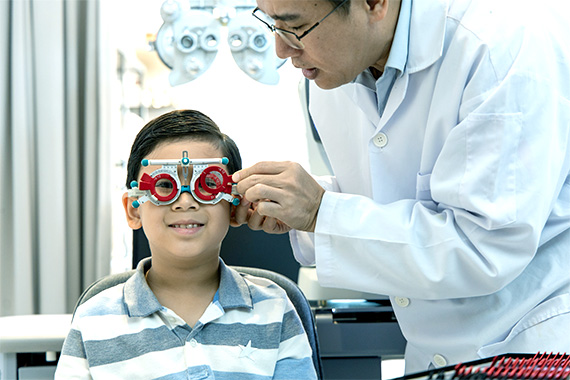Myopia, commonly known as nearsightedness, is a refractive error where distant objects appear blurry while close objects can be seen clearly. Early diagnosis and treatment of Myopia are crucial to prevent the progression of the condition and potential complications. At Shree Ramkrishna Netralaya, we offer comprehensive Myopia treatment and surgery, utilizing advanced diagnostic tools and personalized care to ensure the best outcomes for our patients.

Book Appointment Download Brochure
Myopia is diagnosed through comprehensive eye exams, which include several specialized tests to assess the extent of the refractive error. These exams typically begin with a standard visual acuity test, where patients read letters on a chart to determine how well they can see at various distances.
Advanced diagnostic tests may also be used, such as corneal topography, which maps the curvature of the cornea, and optical coherence tomography (OCT), which provides detailed images of the retina. These tests help in creating a precise treatment plan tailored to the patient's specific needs.
Shree Ramkrishna Netralaya offers a range of Myopia treatment options based on the patient’s age and the severity of the condition:
Recovery after Myopia surgery varies depending on the procedure performed. Most patients experience a gradual improvement in vision within the first few days post-surgery. During the recovery period, it’s essential to attend all follow-up appointments, where your doctor will monitor your healing process and make any necessary adjustments to your treatment plan. Patients may be advised to wear protective glasses, avoid strenuous activities, and limit screen time to promote healing. Mild discomfort, dryness, or sensitivity to light are common during the initial recovery period and can be managed with prescribed eye drops or medications.
Some patients may experience an allergic reaction to eye drops or anesthesia.
Glare, halos, or double vision may occur during the initial recovery period.
Mild to moderate pain or discomfort is common after surgery but can usually be managed with medication.
Some patients may experience dry eye symptoms, which can be relieved with lubricating eye drops.
Though rare, infections can occur and require prompt treatment to prevent complications.
A cutting-edge laser technology that reshapes the cornea for precise vision correction in Myopia patients.
This technology allows for a more personalized approach to Myopia correction by measuring and correcting higher-order aberrations in the eye.
Specialized contact lenses designed to slow the progression of Myopia in children and adolescents.
At Shree Ramkrishna Netralaya, our team of experienced eye specialists is dedicated to providing the highest standard of care.
Shree Ramkrishna Netralaya in Thane, Mumbai, and Navi Mumbai is your trusted partner for advanced Myopia (Nearsightedness) treatment and surgery. With our state-of-the-art technology, experienced doctors, and a patient-centric approach, we ensure that you receive the highest quality care. Schedule a consultation today to take the first step towards a better vision.
Myopia occurs when the eyeball is too long, or the cornea is too curved, causing light to focus in front of the retina, resulting in blurred distance vision.
While Myopia cannot be cured, it can be effectively managed with glasses, contact lenses, or surgery to correct vision.
Yes, Myopia surgery, such as LASIK for nearsightedness, is generally safe with a high success rate. However, like any surgery, it carries some risks, which should be discussed with your doctor.
Regular eye exams, proper use of corrective lenses, and treatments like low-dose atropine drops can help slow the progression of Myopia.
Most patients recover within a few days to a week, but it may take a few weeks for the vision to stabilize fully.
While Shree Ramkrishna Netralaya is your top choice for eye care in Mumbai, you may also consider our other reputable clinics and hospitals near you.
Address:
201 & 202 Elmer #Plot #563, Central Avenue, Corner of, 11th Rd, Chembur, 400071
Phone: 082917 14838
Timing: Mon-Sat- 10 a.m. To 8 p.m.
Address:
Near Risk Care Hospital, Near Makhamali Talao, LBS Marg, Thane, W, Mumbai, Maharashtra 400601
Phone: 02225441139
Timing: Mon-Sat- 11 a.m. To 8 p.m.